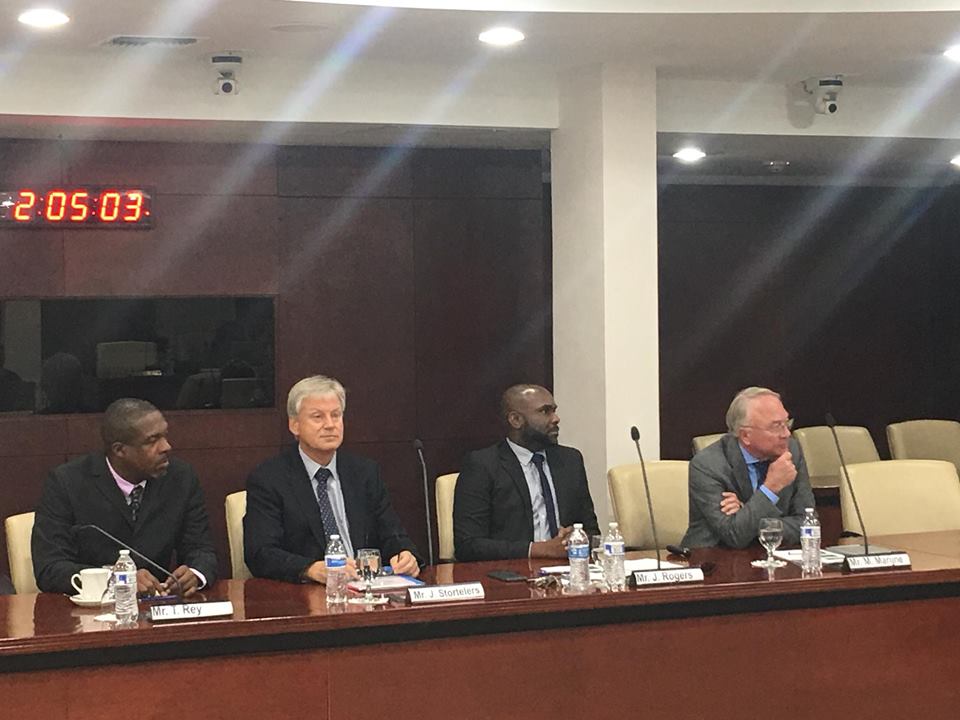Progress Committee: ‘Safety of the population is at risk”

PHILIPSBURG — St. Maarten’s Plans of Approach for the police and the prison – dating back to 2010 – have not been realized by a long shot and the situation at the Pointe Blanche prison is so bad that it puts the safety of the population at risk. This appears from the 31st report by the Progress Committee. The report contains explicit criticism of the Ministry of Justice and, by extension, of Justice Minister Cornelius de Weever.
 The Progress Committee consists of chairman Nico Schoof and members Michel Marijnen and local attorney Jason Rogers. Gert Jan Stortelers , former Dutch Representative in St. Maarten, and St. Maarten-based Terrance Rey take care of the committee’s secretariat. The committee visited St. Maarten from October 28 to November 2 of last year. In the meantime, a second visit has taken place in the week of January 28, 2019 – but the results of this visit are not part of the report.
The Progress Committee consists of chairman Nico Schoof and members Michel Marijnen and local attorney Jason Rogers. Gert Jan Stortelers , former Dutch Representative in St. Maarten, and St. Maarten-based Terrance Rey take care of the committee’s secretariat. The committee visited St. Maarten from October 28 to November 2 of last year. In the meantime, a second visit has taken place in the week of January 28, 2019 – but the results of this visit are not part of the report.
The Netherlands extended a helping hand after Hurricane Irma with assistance from the national police and with a list of agreements about detention. “From the government in St. Maarten, there is little to no movement,” the report states. “The minister does nothing with the committee’s advices and the mandatory advising for the prison has been left out of the replaced Plan of Approach. The administration of justice is completely insufficient.”
The Progress Committee’s mandate was extended for the fourth time on 10-10-2018 until 2020, but the report offers a gloomy outlook on the future. “There is no reason whatsoever to assume that the Plans of Approach will be completed by 10-10-2020. Not even close.”
The police force operates with not even half of its desired minimum strength of 270. With the assistance of 32 officers from the Dutch National Police, the force now is currently 134 strong. Dutch assistance ends in 2020 and by that time the maximum inflow from BPO (the Basic Police Training) is 58; that would bring the total strength to 192 if people leaving the force during the next two years are left out of the equation. “This is far from the desired strength of 270,” the report notes.
Considering a natural turnover of six people per year, the Progress Committee says that the inflow of new personnel at the police force must be 50 per year, but that number remains a pipedream: in 2018 and 2019 not even half of that number joined or will join the ranks.
The Pointe Blanche prison remains a major headache. “For years the prison has not met the standards for safety and quality. We expect that agreements to make the prison fit for the return of prisoners from other countries will not be met. After the return of the prisoners there will be again the explosive and unsafe situation the committee already descried in its 2017-reports. It is unsafe for the staff, the inmates and even for the community.”
The situation at the prison has also caught the attention of the Law Enforcement Council. In a recent advice it called on the Kingdom’s guarantee function.
“The Progress Committee is of the opinion that the administration of justice, in particular the functioning of the Ministry of Justice, the limited strength of the police force and the weak detention function is so insufficient that the safety of the population is at risk.”
The committee advises – “urgently and again” – to set up a mutual regulation Safety Sint Maarten, a cooperation regulation or a governing agreement, focused on the proper functioning of the Ministry of Justice and the chain in the administration of justice. “This requires a significant change in priorities from St. Maarten and a large effort in terms of funding and manpower.” The Netherlands would also have to contribute financially and with staff.
On October 19, 2018, the Ministerial consultation decided at the suggestion of Minister De Weever to replace the Plan of Approach for the prison with a plan called “A safe community: creating a responsible and sustainable execution of sanctions in Sint Maarten.”
While the committee considers this plan as “excellent” it bemoans the fact that it has not been consulted. Now the committee notes that the plan lacks specific, measurable and time-dependent results and a time schedule. It is therefore not a plan of approach, the report states.
There are also other issues with this plan: St. Maarten’s policy and budget plans do not contain substantial provisions to meet the plan’s requirements. The committee advises Minister de Weever to present an execution-oriented plan that meets the requirements of the cooperation agreement. The minister has promised to do this.
Since 2013, the Progress Committee has criticized St. Maarten for not making funding available for the execution of the Plans of Approach. Minister of Finance Perry Geerlings promised the committee that the costs for executing the plans will be made visible in the 2019 budget and that he will mention the topic in the explanatory memorandum.
According to the Progress Committee this promise will not solve the problem. “It will improve the insight but it does not mean that there is substantial funding for the Plans of Approach. According to the Minister of Finance, that money is not there.”
The committee found some relief with the Board financial supervision (Cft); the financial supervisor will see to it that the costs related to the execution of the Plans of Approach are made visible in the national budget as “legally mandatory expenditures.”
The failure to establish the function books for the police and the prison is another sore point. The report strongly suggests that the Ministry of Justice is dragging its feet: “Every time they find a reason to start the procedures from the beginning.”
Minister De Weever told the committee that an external company is assessing the costs of implementing the function books. “However, six months ago he said that an associate had been designated to finalize the explanatory memorandum in a hurry.”
Based on these experiences, the committee labels “the formalizing of whatever function book illusionary” and speaks in this context of the government as a bad employer. “Sint Maarten is the employer and every minister who represents the country as such has a responsibility to care for the staff’s legal position.”
The Progress Committee visited the Pointe Blanche prison in the company of St. Maarten’s member of the Law Enforcement Council, Franklyn Richards. They found that the exterior wall of the prison complex had been restored, but that an electronic security system was still missing. The security provided by marines outside the prison ended on November 1 of last year and the security measures after that date were unclear at the time of the visit. The security towers were manned by unarmed private security officers. Cells were leaking, proper locks were lacking and the fire alarm system was not functioning.
Minister De Weever also failed to live up to his promise to appoint a new prison director within a week after the Progress Committee’s visit. On October 19, 2018, Prime Minister Leona Romeo-Marlin, Justice Minister Cornelius de Weever and Finance Minister Perry Geerlings agreed with representatives of the Dutch government on a list of agreements. The minister of justice promised in those agreements that he would realize a number of improvements at the prison to enable the return of inmates from the Netherlands.
The committee has little confidence in the promise that the list of agreements is a priority and that its execution is not a problem. “Fixing a small part of the exterior wall with external financing took more than half a year. The committee wonders from where the resilience will come to execute the list of priorities in a timely manner.”
###
Related article:
Opinion: “An interesting move” by Hilbert Haar























